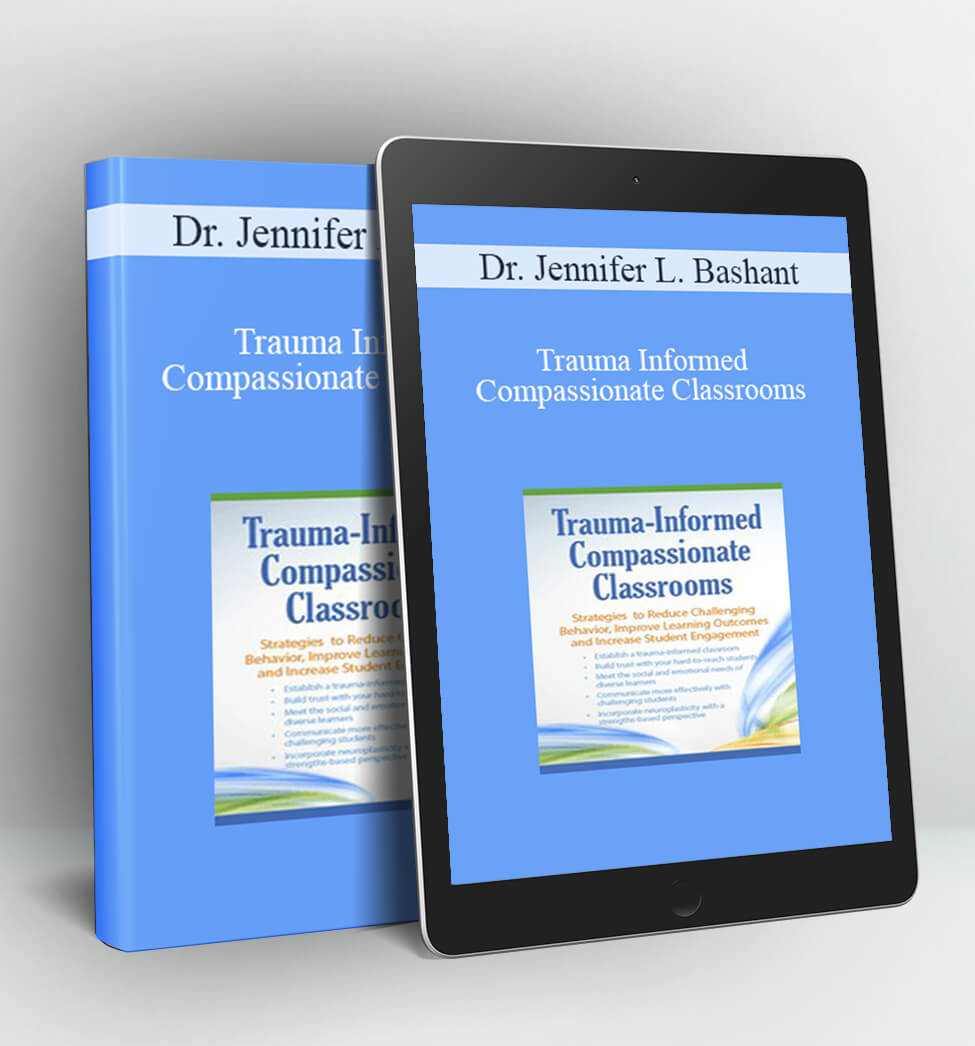Trauma Informed Compassionate Classrooms – Dr. Jennifer L. Bashant
- Faculty:
- Dr. Jennifer L. Bashant
- Duration:
- 6 Hours 2 Minutes
- Format:
- Audio and Video
- Copyright:
- Oct 24, 2018
Description
As an educator, you are faced with the challenge of meeting the social and emotional needs of all your students. This can be challenging enough with typical learners but it is even more difficult with those who have experienced trauma or have mental health challenges. Students who have experienced trauma often present as difficult to engage and display problematic behavior such as a low frustration tolerance, angry outbursts or difficult social relationships. These behaviors all get in the way of teaching and learning. When a student has experienced trauma, he/she often spends much of the day in fight/flight/freeze mode which limits their capacity to learn. Their outwardly aggressive and irritable behaviors also disrupt the flow in the classroom, requiring your time and attention. Despite the amount of time you invest in behavior charts or incentives for good behavior, traditional behavioral approaches to classroom management and a punitive approach to discipline simply are not effective.
Watch Dr. Bashant and learn how a trauma-informed approach will greatly reduce challenging behavior, improve student engagement and increase learning outcomes. Finish this recording with new strategies, tools and resources to reduce students’ impulsiveness, aggressive behaviors and inattention and increase their focus, attention and compassion. While this positive approach is absolutely essential for students with trauma, it will also greatly benefit each and every student in your classroom. Return to your school with:
- Research-based practices to establish a trauma-informed classroom
- A plan to develop positive relationships and build trust with your hard-to-reach students
- Prove techniques for communicating more effectively and collaboratively with challenging students
- Cognitive skill-building strategies which incorporate the science of neuroplasticity and the strengths-based perspective of neurodiversity
Handouts
| Manual – Trauma Informed Compassionate Classrooms (7.25 MB) | 68 Pages | Available after Purchase | |
| Instructions for ASHA Credit – SELF STUDY ONLY – 10/24/18 (0.02 MB) | Available after Purchase |
Outline
Trauma in Students: What to Look For
- Fight, flight or freeze responses: How it manifests in school
- Wired for fear: Impact on the whole child
- ACEs – Adverse Childhood Experiences study and survey
- The role of poverty and mental health challenges
Trauma Therapy
- Benefits
- Limitations of the Research
- Potential Risks
Discipline in a Trauma-Informed Classroom
- Changing your mindset: Punitive vs. collaborative
- Strategies to foster intrinsic motivation
- 3 steps to implement a collaborative approach
- Case study: How you respond
Neuroplasticity: Activities to Establish & Strengthen Neural Pathways
- Strategies to develop new ways of responding
- Slow down, stop and think
- Respond rather than react
- Social stories
- Techniques to incorporate the 4 R’s:
- Rhythmic
- Repetitive
- Relational
- Rewarding
Relationships as a Protective Factor
- Techniques to form positive relationships and increase students’ likeliness to:
- Stay in school longer
- Work harder
- Increase test scores & grades
- Increase their self-confidence
- Techniques to help students feel connected to school making them less likely to:
- Smoke or drink
- Have sexual intercourse
- Develop emotional problems
- Experience suicidal thoughts or attempts
- Carry weapons
- Be involved in violence or dangerous activities
- Case study: Strengths-based, solution-focused approach
Mindfulness and Self-Awareness Activities To:
- Help with transitions
- Reduce impulsive behaviors
- Strengthen empathy, kindness and compassion
- Calm and focus attention
Social and Emotional Learning Techniques to Increase:
- Focus and concentration
- Impulse control
- Conflict resolution skills
Mindful Communication Tools to Improve Student Engagement
- Lead with presence
- Attention
- Intention
Mindful Strategies to Increase Connection, Empathy & Community
- Gratitude
- Heartfulness
Zones of Regulation to Teach Self-Awareness & Emotional Control
- Red zone
- Yellow zone
- Green zone
- Blue zone
Faculty
Dr. Jennifer L. Bashant, Ph.D., LMSW, MA Related seminars and products: 1
Building Better Futures, LLC
Jennifer L. Bashant, Ph.D., LMSW, MA has a mission to provide educators with evidence-based strategies to reduce challenging behavior in the classroom and create a positive impact on learning. Her approach is trauma-sensitive and strengths-based, and she seeks to foster collaborative relationships between educators and students as they work together as partners in learning. Jennifer incorporates collaborative problem solving, restorative practices, and mindfulness in her work with students ages kindergarten through grade 12.
Jennifer is a certified trainer in DiSC Work and Communication Styles, EQ-i 2.0 Emotional Intelligence, mindfulness, and restorative practices. As a licensed social worker with over 20 years of experience, she shares her knowledge and expertise in a way that is heart-centered, practical, and relevant on the ground and in the trenches.
Speaker Disclosures:
Financial: Jennifer Bashant is the owner of Building Better Futures, LLC. She receives a speaking honorarium from PESI, Inc.
Non-financial: Jennifer Bashant has no relevant non-financial relationship to disclose.
Access Download Trauma Informed Compassionate Classrooms – Dr. Jennifer L. Bashant right now!
Delivery Method:
After your purchase, you’ll get access to the downloads page. Here, you can download all the files associated with your order.
Downloads are available once your payment is confirmed, we’ll also send you a download notification email separate from any transaction notification emails you receive from Vinlearn.




